What are Dental Implants?
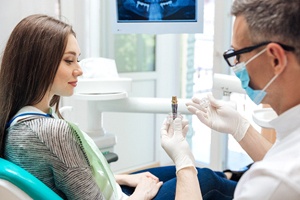
Dental implants are small titanium posts that mimic the natural tooth root.
Surgically placed into your jawbone, they support a custom-made restoration
(i.e. dental crown, bridge, denture) and replicate the structure of your
missing tooth. Because of its placement, the implant fuses to the bone and
surrounding tissue over time in a process known as osseointegration and
becomes a permanent fixture within your oral cavity. This allows you to eat
and speak with greater confidence as well as enjoy restorations that look
and feel like regular teeth.
The 4-Step Dental Implant Process

Dental implants have unique benefits, so they require a multi-step process that spans several months. This may seem like a while, but it is well worth the time and effort. We are partnered with trusted specialists in the DFW area to ensure that your procedure goes as smoothly as possible. Every treatment process is different, but here are the 4 main steps that you can expect when you get dental implants.
Learn More
Initial Dental Implant Consultation

The first step when you get dental implants is to attend a consultation. During this time, we will examine your smile and go over your medical history to determine if you are a good candidate for the procedure. If necessary, we can discuss preliminary treatments, like gum disease therapy, bone grafting, or tooth extractions. These types of treatments can help to ensure your dental implant’s success. After this, we can move on to planning the rest of your dental implant treatment. We will walk you through the different steps as well as the financial aspects of the procedure.
Dental Implant Surgery

We work with a local specialist to ensure that your dental implant procedure goes as smoothly as possible. Your mouth will first be numbed with a local anesthetic to make sure you remain comfortable during the procedure. Then, an incision is made into the gum tissue so the implant posts can be placed into the jawbone. Next, the gums are closed and protective caps are placed over the posts.
Dental Implant Osseointegration & Abutment Placement

Osseointegration takes place when the biocompatible titanium implant fuses to the jawbone. This is what keeps the implant so stable in the bone. When the fusion process is complete, metal abutments are placed on the end of the implants. Your final restoration will be crafted from impressions taken of your mouth.
Delivery of Dental Implant Restorations

The last step in getting dental implants is the delivery of your replacement teeth. You will need to return to the practice so we can place your crown, bridge, or denture on your implant(s). During this time, we will make sure that your bite lines up and your new smile is comfortable. This way, you will be completely ready to enjoy the benefits of your complete smile!
Benefits of Dental Implants

When learning more about dental implants, it is hard to overlook the many benefits they offer to patients
with missing teeth. You likely want a solution that will not only give you enhanced aesthetics but will also
keep your oral health from declining. Fortunately, implants are a great way to address both issues while
allowing you to experience far more than you think. Below, you will find a thorough list of the many
benefits of dental implants:
Learn More
Day-to-Day Benefits

-
Eat your favorite foods -
Greater, more even bite force, allowing you to chew and eat with greater confidence and
enjoy the foods you love.
-
Better quality of life –
Ability to live the life you love because of greater ease of speaking, eating, and smiling.
Unlike denture-wearers who often hide their smiles and avoid speaking, you can feel more
confident with your new, firmly-rooted teeth.
-
A more beautiful appearance -
Enhanced aesthetics and boosted confidence.
-
Easier maintenance –
Dental implants make it easy to keep your natural and artificial teeth clean and free of
potential decay and disease. All you need are regular dental hygiene products.
Health Benefits
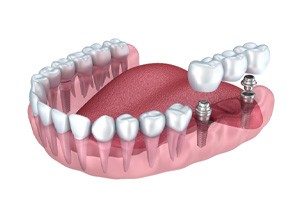
-
Preservation of remaining teeth
–You can avoid altering healthy teeth that are otherwise required with fixed bridges.
-
Stimulate the jawbone
– Improved oral health by continuing to stimulate the jawbone and prevent bone
resorption and/or facial collapse.
-
Stabilize adjacent teeth
– Dental drift is not a concern when an implant dentist places these titanium posts.
It keeps healthy teeth firmly in place, minimizing the need for orthodontic treatment.
Long-Term Benefits

-
High-success rate
– Dental implants have an initial placement success rate of 95%, which is unlike other
prosthetic tooth replacements.
-
Greater longevity
– A restoration that is designed to last decades with proper care and maintenance.
-
Cost-effective solution
– Instead of paying for denture adhesives and regular replacements or adjustments,
dental implants cost less in the long run. This is also evident through lower expenses on
overall health problems that can often arise as a result of tooth loss.
Indications for Dental Implants
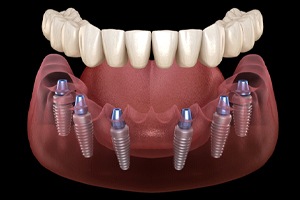
Another added benefit of dental implants is they are versatile. Whether you
have one missing tooth, multiple, or an entire arch, they can repair and
restore your smile in a way that other solutions cannot.
Missing Single Tooth
If you are only missing a single tooth, your dentist in Dallas can
use one titanium implant and metal abutment before having a customized
dental crown created to sit on top of the post.
Missing Multiple Teeth
If two or more teeth are missing consecutively in a row, there’s no
need to worry. We can recommend you receive two dental implants that will
sit on the outer vacated sockets. Once your custom bridge is created by lab
technicians, we will carefully secure it to the implants, filling in the gap
and allowing you to enjoy a healthier smile.
Missing All Teeth
When faced with an entire arch of missing teeth, don’t assume
traditional dentures is all you’ll be eligible to receive. Instead, an
oral surgeon can place 4-6 dental implants along your jawbone to create a
firm foundation for a customized denture. Instead of worrying about dental
adhesives to keep your restoration in place, you can feel more confident
knowing your denture is secured to the tops of your implants.
Partners with Trusted Professionals in the DFW Area
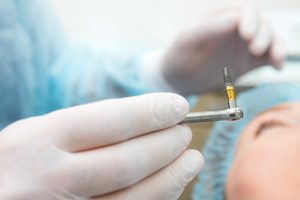
Dr. Vanderbrook wants your experience in receiving dental implants to be a
success. This is why he partners with only the best in the DFW area. From
trusted periodontists to highly-skilled oral surgeons, he will work closely
to ensure your procedure is successful. Once your implants are in place and
you’ve finished recovering at home, you will return to our dental
office to receive your finalized restoration.
Who Dental Implants Can Help

Another added benefit of dental implants is they are versatile. In fact, whether you have one missing tooth,
multiple, or an entire arch, they can repair and restore your smile in a way that other solutions cannot! If you are
considering this tooth-replacement solution for yourself, read on to learn more about it, including the qualities
that make a patient a good candidate.
Learn More
Who Is a Good Candidate for Dental Implants?

At your consultation, we will review your dental history, learn about your smile goals, review your
latest X-rays,
and conduct a comprehensive oral exam. The goal? To determine if any preliminary treatments are needed,
how mild or
severe your case is, and if you’re willing to commit to good dental care habits, like brushing
your teeth each
morning and evening. With all of this information, we can determine if dental implants are an option
and, if they
are, begin working on your custom treatment plan.
Missing One Tooth
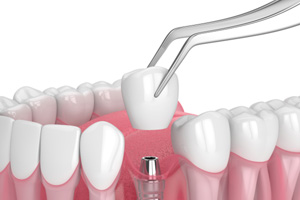
If you are only missing a single tooth, your dentist in Dallas can replace it with a single dental
implant! This
requires us to insert a titanium implant into your jawbone before securing a metal abutment in place.
Then, we will
create a custom dental crown to restore the visible portion of your tooth as well. After your final
appointment,
you’ll walk out of our office with a complete, healthy, and beautiful smile.
Missing Multiple Teeth
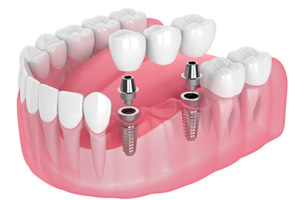
If two or more teeth are missing consecutively in a row, there’s no need to worry –
that’s where
implant bridges come in! Once your custom bridge is created by lab technicians, we will carefully secure
it to the
implants, seamlessly filling the gap in the process.
But what if you are missing several teeth throughout your mouth? In that case, we can either replace each
tooth with
a single dental implant or anchor a partial denture in place with dental implants. Simply put, this
state-of-the-art
tooth-replacement solution is still an option, so don’t hesitate to schedule a consultation!
Missing All Teeth
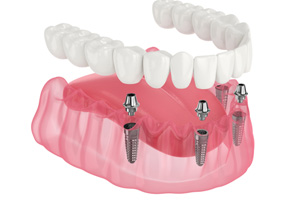
When faced with an entire arch of missing teeth, don’t assume traditional dentures are all
you’ll be
eligible to receive. Instead, an oral surgeon can place 4-6 dental implants along your jawbone to create
a firm
foundation for a customized denture. You won’t have to worry about special adhesives to keep your
restoration
in place either; you can feel more confident knowing your denture is secured to the tops of your
implants, allowing
you to speak, laugh, and chew with complete confidence.
Understanding the Cost of Dental Implants

Dental implant costs vary from case to case. Replacing a single tooth may
cost a few thousand dollars, while full-arch replacement may cost anywhere
from $35,000 to $60,000. Those numbers may seem steep at first, but it’s
important to consider long-term costs. Dental implants in Dallas
have the potential to last a lifetime, which means they may actually be
cheaper over time than non-implant options that need to be replaced every
few years. Plus, they offer remarkable benefits that are impossible to
assign a monetary value to.
Learn More
Preliminary Treatments & Dental Implant Surgery

It is common for patients to require preliminary treatment, such as
gum disease therapy or tooth extractions, before they can receive
dental implants. Each of these services incurs its own fee. The
implant placement surgery also has a separate cost, which depends on
how many implants are being placed and other factors. The specialist
that
Dr. Vanderbrook
refers you to for your surgery will talk to you about its price and
your payment options.
The Parts of Your Dental Implant
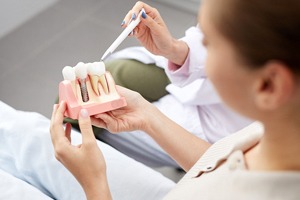
There are numerous implant treatment options in modern dentistry. Some
treatments involve the use of just one or two implants, so they cost
less than treatments that require more implants. Also, there are many
different implant manufacturers that charge a range of fees for their
products. If more than one type of implant treatment is right for you,
our team will talk to you about their pros, cons, and costs so you can
make an informed decision about how to move forward.
Final Dental Implant Restoration
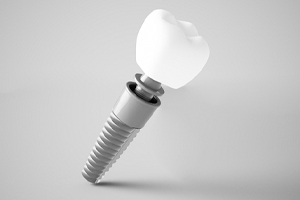
Implant restorations vary in price. A single implant-supported crown
logically costs less than an implant-supported denture or a multi-unit
bridge. Restorations may be made out of various materials, such as
acrylic and porcelain, which may have different price points.
Does My Dental Insurance Cover Dental Implants?

It is becoming more and more common for
dental insurance
policies to cover dental implants. However, many still do not. Our team
will help you navigate your benefits and file claims in your behalf.
Even if your policy does not cover dental implants themselves, it might
cover other parts of your treatment, like preliminary services or your
final restorations.
Making Dental Implants Affordable

Dr. Vanderbrook and our team want to help you afford your new smile!
That is why, in addition to helping you with your insurance, our
practice is pleased to accept financing from CareCredit. CareCredit is a
third-party lender that provides low-interest payment plans for medical
and dental services. We will always be upfront with you about prices,
and we are ready to answer any questions you have about our payment
policy. We pride ourselves on making every aspect of the treatment
process as easy as possible!
Maintaining & Caring for Your Dental Implants

Now that you’ve successfully received your dental implants, you’ll be able to make the most of the numerous benefits
of your new smile. Still, this doesn’t mean you won’t have to do much to keep them in great shape. If you wish to
keep them healthy and effective for a lifetime, you’ll need to implement several precautions and make a few changes
to your daily life. Here are a few ways to maintain and care for your dental implants.
Learn More
Make Oral Hygiene a Priority

First and foremost, you’ll want to keep practicing good oral hygiene every day to preserve your gums and
metal posts. This should include brushing, flossing, and rinsing with ADA-approved mouthwash regularly,
especially after meals to avoid issues like tooth decay and gum disease. With a good oral care routine,
you’ll be sure to keep your new teeth clean and plaque-free!
Eat a Healthy Diet

One of the best parts of getting dental implants is the ability to enjoy your meals without any
restrictions. Even so, you’ll want to take care not to accidentally damage them or wear them down over
time. For this reason, it’s best to avoid overindulging in particularly hard, crunchy, sticky, or sugary
foods. Try eating more vitamin-C and calcium-rich meals to promote healthier gums and stronger jawbone
tissue.
Break Bad Habits

Certain habits can be detrimental to both your oral and overall health, such as smoking and chewing
tobacco. The first thing you’ll want to do is significantly minimize or quit these products if you want
to make the most of your dental implants. If not, you can end up risking implant failure and raise your
chances of developing infection or other serious conditions, like oral cancer. Furthermore, make sure to
avoid chewing on hard objects and using your teeth as tools, as you can accidentally damage or break
your new dental implants.
Protect Your Dental Implants

While your new pearly whites will be durable enough to withstand excessive pressure from chewing, it
doesn’t make them invulnerable to damage. To keep them safe from sudden impacts, either from sports or
physical activity, you may want to invest in custom mouthguards. Additionally, if you tend to grind your
teeth at night, a nightguard can effectively prevent you from wearing your smile down over time.
Schedule Regular Dental Checkups

Even if you’re practicing good oral hygiene and implementing preventive measures, you should continue to
visit your dentist for checkups and cleanings every six months. This will help you keep your smile clean
and will allow them to monitor your oral health so they can address any problems they might detect. With
early preventive care, you’ll have a significantly lower risk of developing issues that could cause your
implants to fail.
Dental Implant FAQs

When it comes to creating permanent, longer-lasting smiles, there’s simply no better choice than
dental implants in Dallas! However, it’s only natural to have some questions about this revolutionary
tooth replacement option before you’re ready to commit to a treatment plan. We’ll be more than
happy to answer all your questions and walk you through every step of the procedure when you come visit us
for your consultation. In the meantime, we’ve gathered a few of the most common questions we get about
dental implants below so you can learn more about them. To find out more or schedule your consultation,
don’t hesitate to
give us a call!
Learn More
Does It Hurt to Get Dental Implants?
Getting dental implants requires a minor oral surgery. However, you’ll be pleased to hear
that the majority of patients report that the process of getting dental implants doesn’t
hurt at all. We partner with trusted local dental implant professionals for the surgical
placement portion of your treatment. They’ll make sure you’re completely comfortable
throughout the surgery, with local numbing medication and likely sedation. The recovery period
is likely to include a week or so of slight discomfort and swelling, but these side effects
should be easy to manage at home.
What Are the Different Types of Dental Implants?
There are numerous different types of dental implants. There are single-tooth dental implants,
implant bridges, and several options for implant dentures. There are also implants that are made
of zirconia instead of titanium, and there are “mini dental implants” as opposed to
traditional dental implants. During your consultation, we’ll work with you and your unique
situation to determine which type of dental implant will be best for you.
How Long Do Dental Implants Last?
Traditional tooth replacement options only last about five to seven years before they need to be
replaced. With dental implants, this inconvenience is a thing of the past! Since dental implants
are embedded directly into your jawbone, they stimulate the tissue just like natural teeth and
keep it strong. Thanks to this unique placement, dental implants can easily last 30 years to a
lifetime!
How Soon After An Extraction Can I Get a Dental Implant?
In most cases, you’ll need to wait several weeks after having a tooth extracted before
replacing it with a dental implant. This will give your gum tissue a chance to heal, and enough
time for whatever oral health problem that prompted the extraction in the first place to be
addressed. Remember, you’ll need to be completely free of any dental abscesses or
infections before a dental implant can be placed.
Am I Too Old for Dental Implants?
It’s no secret that tooth loss becomes more common with age. Fortunately, there is no
upper age limit for getting dental implants! As long as you are well enough to undergo minor
surgery, are free of oral health issues like gum disease, and have adequate jawbone density, you
are a good candidate for this state-of-the-art treatment. If you’re not initially a good
candidate for dental implants, we may be able to help you become one. We can help you overcome
oral health issues like gum disease and refer you to a local specialist to have your jawbone
strengthened with a bone graft!































